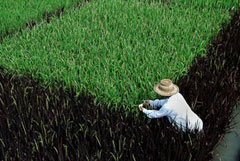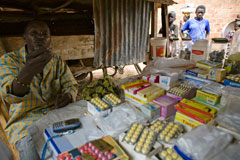The UK Parliamentary Select Committee on Science and Technology has today released its long-awaited report on ‘Advanced genetic techniques for crop improvement: regulation, risk and precaution’.
The ESRC STEPS Centre welcomes the moves made by the Committee – as reflected in the report title – to somewhat broaden out the original narrow terms of the Inquiry. Also to be welcomed are a series of recommendations made by the Committee in relation to all the points, below, that we made in our written and oral evidence. Committee recommendations included some on alternative food innovation strategies, more transparent information, greater public oversight and adoption of many Nuffield recommendations.
However, it is striking that neither the summary nor the press release for the present report make any mention at all that a variety of such recommendations were made by the Committee. Instead, the impression is given that the findings were on exactly the lines determined in the original criticised remit – fixating exclusively on arguments for and against GM alone. This is an unwelcome and worrying development, and raises serious questions over the achievement of a more balanced public debate. We call on the Committee to revise and post a new version of the summary and press release so that they more accurately represent the report and its recommendations.
The Inquiry on which this report is based was initially given a much narrower remit, to look into ‘GM foods and application of the precautionary principle in Europe’. In a letter signed by 19 experts in the field, the STEPS Centre wrote to the Inquiry Chairman, pointing out several serious problems with this remit. The remit was too restrictively focussed on GM alone, neglecting other relevant social and technological innovations offering pathways that could contribute to food sustainability. The original remit also displayed serious misunderstandings of the precautionary principle.
The Inquiry requested that the STEPS Centre contribute more extensive written evidence on this basis, which was later submitted as an annex to the original letter. Signed by the same 19 authors, this evidence further explained the criticisms of the original remit. It was on this basis, that the Inquiry then invited two signatories of the STEPS letter, Professors Brian Wynne and Andy Stirling, to give separate oral evidence to different sessions of the Inquiry.
In their oral evidence, Professors Wynne (29 October 2014 session) and Stirling (19 November 2014 session) further explained the grounds for concern over the exclusion of balanced consideration of alternative innovations beyond GM for sustainable food production. Noting the risks of lock-in, they criticised the lack of transparency over funding priorities in UK public research on different food production strategies.
Wynne and Stirling also pointed out the failure to understand that the precautionary principle is a uniquely effective regulatory tool for dealing with uncertainty rather than risk. Along with many other witnesses, Professor Stirling called for more open, inclusive and democratically accountable debate over alternative innovation pathways in this field. He argued that attention be given to recommendations of the recent Nuffield Council on Bioethics Report on ‘Emerging biotechnologies: technology, choice and the public good’.
Find out more
- GM Food and the precautionary principle
 – resources from the Select Committee inquiry and evidence sessions
– resources from the Select Committee inquiry and evidence sessions - Innovation choice in the face of uncertainty
The STEPS Centre’s work on GM and biotechnology around the world
A selection of our work on how science, policy and politics interact around biotechnology.
The Politics of GM Food:  Risk, science and public trust
Risk, science and public trust
Why do controversies such as BSE and GM food throw British governments and business off balance? This briefing on how to get out of the GM impasse and how to avoid these problems in future, remains as vital and current today as when it was written by Alister Scott, Frans Berkhout and Ian Scoones (Director of the STEPS Centre) in 1999.
The Politics of GM Food: Risk, science and public trust (PDF) ESRC Global Environmental Change Programme (1999). The Politics of GM Food: Risk, Science &Public Trust, Special Briefing No 5.
 Biotechnology Research Archive
Biotechnology Research Archive
10+ years of research into GM crops, development and the food crisis, under four themes:
- Poverty reduction & food security: impacts of GM crops
- Regulating GM crops
- The role of the private sector and corporate control
- Public participation and the politics of policy
Projects
- Rethinking Regulation Seeds and drugs in China and Argentina
- Beyond Biosafety How to ‘open up’ debates about and beyond biosafety in Kenya and the Philippines.
Books, blogs, media, articles
 Rice Biofortification: Lessons for Global Science and Development by Sally Brooks (Earthscan 2010)
Rice Biofortification: Lessons for Global Science and Development by Sally Brooks (Earthscan 2010)- Regulating Technology: International Harmonization and Local Realities by Patrick van Zwanenberg, Adrian Ely and Adrian Smith (Earthscan 2011)
- If GM is the answer, it is only the answer partly, sometimes, maybe (Ian Scoones, Think Africa Press, June 2014)
- Why the fuss about GM food? Other innovations are available (Andy Stirling, The Guardian – Political Science blog, 28 June 2013)
- GM crops ten years on: hope, hype and reality (Ian Scoones, Institute of Development Studies, May 2009)
- ‘Golden Rice’ and the GM crop debate (Sally Brooks, 24 June 2013)
- GM Crops: what people in the global South really think (Dominic Glover, 17 June 2014)
- Undying Promise: Agricultural Biotechnology’s Pro-poor Narrative, Ten Years On by Dominic Glover (STEPS Centre 2009)
- Is international agricultural research a global public good? The case of rice biofortification (2011) by Sally Brooks, Journal of Peasant Studies
Media enquiries
Julia Day, STEPS Centre Head of Communications
Email: [email protected] | +44 7974 209148
 – resources from the Select Committee inquiry and evidence sessions
– resources from the Select Committee inquiry and evidence sessions Risk, science and public trust
Risk, science and public trust
